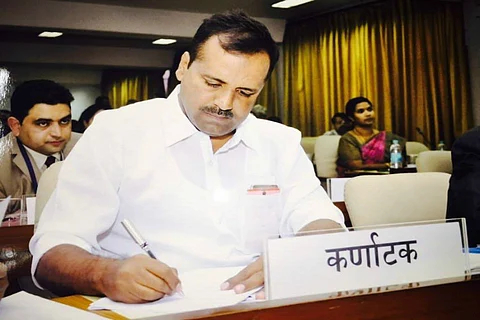

On March 22, 26 newborns survived a fire that broke out from an air-conditioner in the NICU ward in the government hospital in Kalaburgi district. Earlier in the month, a 7-year-old girl suffering from a general flu, had to undergo a major operation after a nurse in Chitradurga district left a needle inside her buttocks.
These two cases are merely the tip of the iceberg. It’s hardly surprising then, that a recent CAG report castigated the Karnataka government for the dismal state of public healthcare in the state.
However, the state's health minister UT Khader thinks the healthcare system should not be condemned outright, despite lacunae pointed out in the CAG report. In an exclusive interview with The News Minute, Khader discussed some of the problems of the sector, and proposals and plans made to overcome them:
If there are some aspect of the healthcare system in Karnataka you’d like to improve, what would they be?
I feel the system requires human resources, followed by training and commitment, and better equipment and management.
There is a scarcity of human resources. We need more man power — doctors, nurses and paramedical staff — in the hospitals. We recently recruited over 1,500 personnel for rural areas, and the training for the new appointees is underway. We have 300 more positions vacant, which we aim to fill by June 2016.
When it comes to equipment and it upkeep, over 30% to 40% of medical equipment is under repair or destroyed. This happens especially because the staff is not trained
enough to handle it.
But at times it is deliberately damaged. Sometimes people do even not bring it to our notice. This is a recurring problem, because functional equipment is only going to add to the staff’s workload.
There is a huge lack of commitment and sincerity too, especially with doctors who have private practice. They take their job lightly because it is a government job.
We are not stopping them from having their own private practice after their working hours at PHCs. But most of them give importance to their private practice, because if there is no doctor at the PHCs, it means more business for their private practice. If such cases come to our notice, we are ready to suspend them…
These doctors come from a comfortable college environment and they don’t want to serve the rural areas. They forget that practical experience in rural areas would add value.
However, to make sure that equipment is intact, we are getting a Medical Equipment Monitoring Cell. A private agency will be given the responsibility to rectify any technical problems. It is a transparent process where the person who has reported the problem to the agency will have to certify that the work is done and only then the company would be paid for their services.
There have been instances when PHC personnel go on leave when a rape survivor or assault victim comes in for examination. What are you doing about it?
I have announced a training programme for nurses to handle cases registered under POCSO Act. However, training is not the only problem.
There have been clashes in opinion between the women and child welfare department and health department, who hold responsibility of the victim. The department’s demands are not very reasonable. They ask for a 10-bed ward. Then the victim is kept waiting giving a chance for media and people intrude into the area while examination goes on.
The general ward has relatively undertrained nurses and attendants, and they are not experienced enough to handle that attention.
I have ordered for victims to be taken directly to the ICU, where there is privacy and such problems would not occur.”
Until about 2013, there was a wide regional disparity in the allocation of health centres. The Old Mysuru region had more centres than in the North Karnataka region. In addition, there is a shortage of staff in the few health centres that are there. Your response.
Districts like Yadgir and others in north Karnataka are so backward that they would take over a decade to match the level that Bengaluru is in. In the north Karnataka region, especially in districts like Yadgir, people are very uneducated, making it difficult for us to create awareness about healthcare and hygiene.
The condition in the Hyderabad-Karnataka region has improved, but there is a lot to be done. We have tied up with hospitals in Solapur in Maharashtra and Hyderabad in Telangana. If a resident of Karnataka goes there for treatment, we will pay [for their treatment] based on the schemes available.”
Is 4% of the budget really enough to implement the government’s plans?
Most plans made by any ministry exceed the amount allotted from the budget. The government has given 4% and there is an increase in the amount allotted this year. We are doing our best to use that amount to get new schemes in place.
Healthcare activists say that charging a minimum user-fee in autonomous hospitals discourages individuals from seeking medical help. How would you counter this?
There is no going back on it. It is a minimal amount like Rs 100 for x-rays which people don’t mind paying. If they don’t pay that amount here, they would have to cough up Rs 500 at a private hospital. If the treatment is free, people tend to abuse it by walking in even when they don’t have a problem.
You proposed the Good Samaritan Act recently. How will it work and how will you ensue implementation?
We have proposed the Good Samaritan Act under which every accident victim would get free treatment for 48 hours from the time of the accident. No details are to be asked except for gender. In super-specialty hospitals, free treatment up to Rs 25,000 is available, and in district and taluk level hospitals, it is Rs 15,000 and Rs 5,000 respectively. The local MLA should take charge and get the hospitals in his constituency enrolled under the scheme.